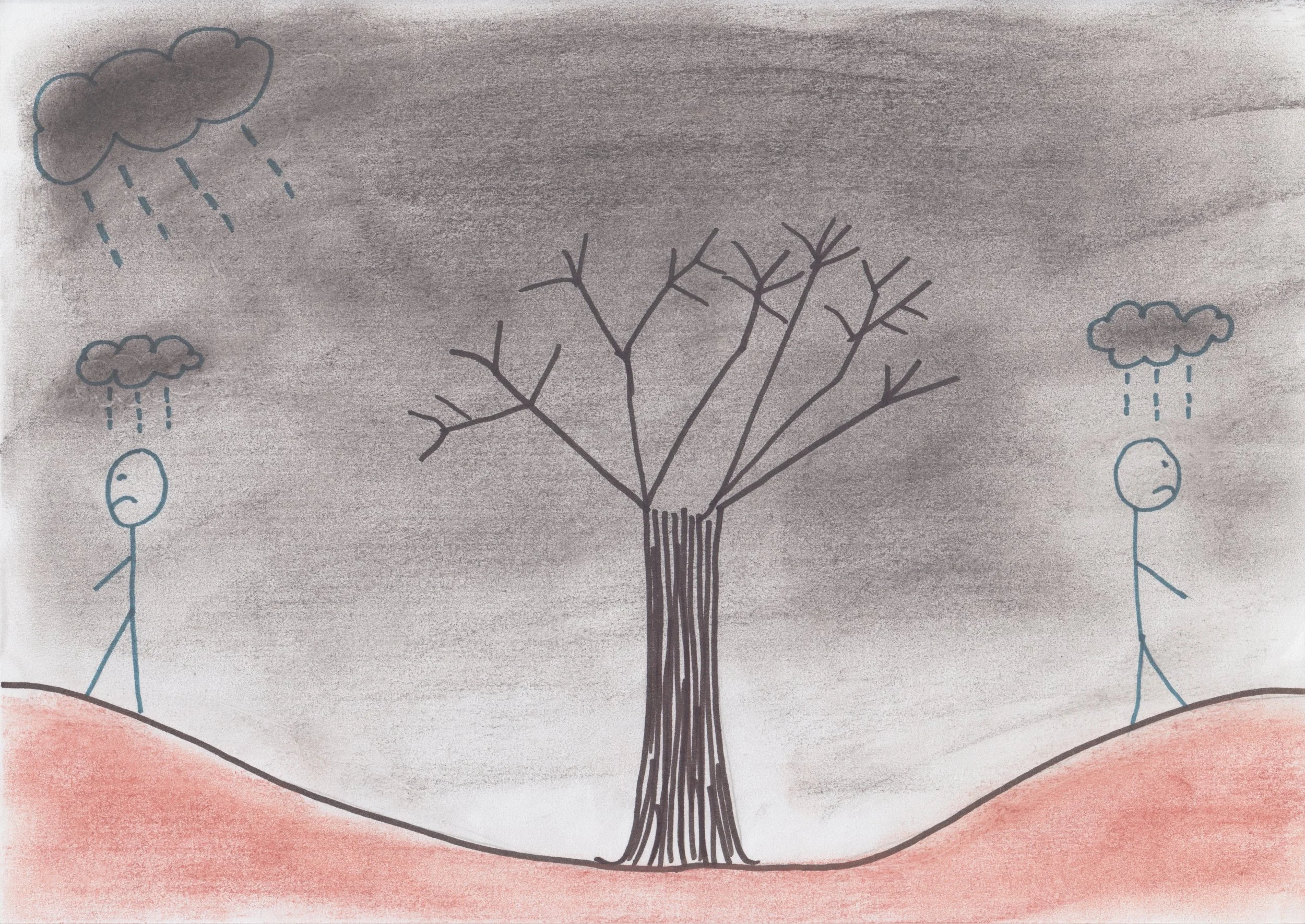
I’m OK, you’re not OK
This is a representation of the world from an ‘I’m OK, you’re not OK’ perspective
How we see ourselves and others
When we see the world from an 'I'm OK, you're not OK' perspective, we believe that we are better than, and more important than others. Our focus will be predominantly on ourselves, because we believe that other people are inferior to and less important than us. As such, we don't treat people equally. Whilst we may appear to be resilient and robust, with self confidence and self esteem, underneath we do not feel 'OK' about ourselves; internally, we're masking feelings of inferiority, low self esteem and low self worth. We will go to great lengths to avoid feeling our vulnerability and our sense of being 'not OK'.
This is not a healthy perspective. Although we might have some sense of feeling 'OK' about ourselves, it isn't an enduring or sustainable sense of being 'OK'. Indeed, we are constantly having to do things and work very hard to maintain a false sense of being 'OK', usually at the expense of others. We're likely to look down on other people, to speak unkindly to them, de-value their opinions and detract from them. Indeed, it's likely that we will do whatever is necessary to maintain our own spurious sense of being 'OK' and to make sure our needs are met above those of anyone else.
At times, our sense of being 'OK' might extend to the people closest to us (for example family and friends), but this isn't consistent and if someone disagrees with us, or dis-pleases us in some way, they will soon become 'not OK' in our perspective.
How we exist in the world
When we see the world from an 'I'm OK, you're not OK' perspective, we have an overgrown sense of self-importance. We're likely to exert power over others, keeping them in a one down position. Indeed, it's unlikely that we will behave in an 'OK' way. We're unable to feel much (if any) compassion, because we're so full of difficult thoughts and feelings. Where there was compassion, empathy and kindness, there is likely to be fear, anger and sadness. This spills out as negativity towards other people. We might not recognise these feelings for what they are, rather they might show themselves to us as negative thoughts about others. For example, we might be quick to anger at what we believe to be other people's failings: their stupidity because they don't see things the way we do, or have different ideas; their incompetence because they have less knowledge or experience than us. Our thinking is rigid and inflexible; we cling tightly to our opinions and beliefs, believing that we are right and everyone else is wrong. We're unlikely, or unwilling to look at new evidence, believing that we know best. When unacknowledged and unchecked, these thoughts grow, becoming beliefs with themes of intolerance, prejudice and hatred; from an 'I'm OK, you're not OK' perspective, the world consists of division and dis-harmony, not connection and equality.
We aren't particularly interested in things that are happening around us; our interests centre around ourselves and getting our own needs met. This means we're less likely to see the bigger picture of life around us, or even be interested in things outside of ourselves. We're challenged by difference and are likely to be intolerant to it. We're not interested in fairness or equality, unless it's us who's treated unfairly. Similarly, justice is not something that concerns us, until it's us who's facing an injustice. There's a pervading feeling of isolation, of every man for himself; it's likely that we'll step over anything and anyone to get what we want, to get to where we want to be. We might come across as being over-confident and arrogant, unwilling or even unable to look at someone else's point of view. Fueled by deep insecurity, we defend against feeling our vulnerability, seeing it in others and shunning it in them as weakness. We will be so caught up in our own experience, that we can have difficulty being present. Indeed, when we see the world from an 'I'm OK, you're not OK' perspective, we're likely to have many interactions which play out in this way, thereby reinforcing our perspective.
We surround ourselves with people who will support our way of seeing the world, who will flatter us and not challenge our perspective. We feel comfortable with them, because they say the 'right' things; they feed our perspective. We might spend time gossiping about others, putting people down, being unkind and derogatory: if you don't wear the same clothes, do the same things, drive a particular type of car, have a certain income, a certain level of education, then you're not OK, in our opinion. We're likely to have difficulty trusting people because we know that we can't be trusted and we apply our own beliefs and values to everyone else. Loyalty isn't something which features when we're looking at the world from this perspective, and we're likely to be fair-weather friends. We'll turn our back on people and switch allegiances when it suits us, without looking back. We will often draw people to us who are likely to offer us the same. Our friendships are, therefore, likely to be shallow, volatile and lacking in longevity.
Our thoughts will have themes of superiority and our own importance; we over-value ourselves and our achievements. Indeed, we might not actually have achieved what we say we have, because we'll take shortcuts, cheat and lie; our behaviour can be self-serving, ruthless and calculating. We're unlikely to be spontaneous, dwelling on events and perceived slights, sticking rigidly to our way of doing things. We won't feel anything very deeply and the joy and happiness we do experience is short-lived and less satisfying; we are so defended that all the positive feelings we might experience cannot be felt fully.
Interactions and problem-solving
When we see the world from an 'I'm OK, you're not OK' perspective, it can be very difficult to behave in an 'OK' way. We're likely to have many interactions which play out in this way; we come away with a self-righteous sense of being 'OK', whilst we perceive other people to be inferior to us ('not OK'). We have a sense of entitlement and when problems arise, rather than looking to ourselves, we blame others and can be unable to see that we might have had a role in creating the situation. Problem solving will usually involve ensuring that we get the outcome we want, often at the expense of others. As we hold our world view very tightly, we can find it difficult to take in new information. Consequently, it's likely that we'll be inflexible and not open to considering solutions which deviate from our way of thinking.
The descriptions on this website are words taken from a collection of books I’m writing.
The four perspectives





